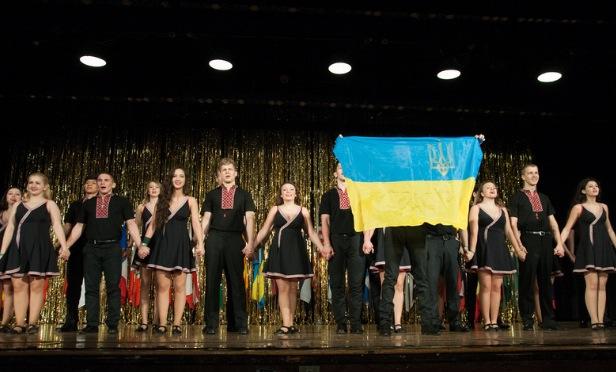Why ethnic backgrounds don’t make Americans any less American
Written by Hrystyna Bobel | Archived Nov. 10, 2020
My high school had a variety of different ethnic clubs and I was a member of the Ukrainian club. This photo was taken during one of our Ukrainian dance performances in 2014. Photo courtesy of Hrystyna Bobel.
At first glance, you wouldn’t suspect me as coming from a family of immigrants. My fair skin and blonde hair suggest that I may fit into a stereotype of typical American women, but the spelling of my name and my accent suggest a different ethnic background.
“Where are you from?” is a common question that myself and other UMD students have been asked on campus, but when I tell people I’m from Chicago, I am usually met with a confused look, followed by the question, “But where are you really from?”
My father (right) and I wearing our matching jerseys at a Chicago Blackhawks game in 2016. We have a yearly tradition of going to a game every time I come home during winter break.
What this question means to ask is, “What is your ethnic background?”
Though it seems like a simple and innocent question to ask, many people do not realize the underlying implication that because of my differences, I must be foreign.
I am Ukrainian. My parents moved from Ukraine to Chicago with my older sister 22 years ago, and I was born the following year, making me a first-generation American.
I’ve been asked a lot of questions about my ethnicity throughout the years and even had drudgingly long conversations about the spelling and pronunciation of my name, “Hrystyna.”
For 12 years, however, I spelled my name “Krystyna” to avoid those conversations. It wasn’t until my senior year of high school, when I met a teacher that encouraged me to use my birth name, that I decided to start spelling it how it was always meant to be spelled: with an “H."
Based on my own experiences, I decided to talk to a few UMD students who are also first generation Americans.
Suenary Philavanh is a second year student at UMD and here is what she had to say:
“I noticed that a lot here in Duluth,” said Philavanh. “I get the question ‘Where are you from?’ I don’t mind it but at the same time I do because it clumps me into this one thing.”
Philavanh was born and raised in Rochester, Minnesota. Her mother is from Cambodia and her father is from Laos. Though she personally identifies as Cambodian, she possesses both Asian and American values and traditions.
One common issue that I have encountered with people in the United States is their inability to grasp the idea that someone can identify with multiple ethnicities or races. One ethnicity tends to outshine the others.
“I am not ashamed to tell people that I am Cambodian,” Philavanh said. “My only problem is that to them I am only Cambodian.”
My first time visiting Ukraine at an FC Karpaty Lviv soccer game in 2007. I am with my sister Maria Bobel (left) and my cousin Yura Zinko (right). Photo courtesy of Roman Bobel.
Another UMD student, Dominic Bisogno, was born in River Falls, Wisconsin, and identifies as mixed race. His father is from Venezuela with an Italian and Chinese background, while his mother’s side of the family can be traced back to arrival on the Mayflower.
“Despite the fact that the U.S. has some of the most mixed people in the world, a lot of people here don’t have a good concept of how that works,” Bisogno said.
This lack of understanding can sometimes lead to the magnification of a person's foreign ethnic background, creating stereotypes and blinding people from the fact that they also possess American cultural values. These judgments can often alienate people.
“I’ve noticed that I am not usually the first person to get picked when working in groups,” Philavanh said. “People tend to choose partners that look like them or that look relatable, even though I could probably relate to them as well.”
Though Bisogno has not had any horrible experiences on campus, it is not easy for him to identify as a mixed-race individual. Once the knowledge of an ethnic background is gained, it becomes the main focus.
“There’s just a lot of awkwardness sometimes about the way people handle the information,” he said. “They make a bigger deal out of it than they need to.”
There is no simple solution to the issues first generation Americans face, but Bisogno has a simple idea.
“I think it’s just a matter of becoming more aware of the fact that you [white Americans] are just as inspired or impacted by foreign influences as I am,” Bisogno said. “Other than the occasional food dish and an occasional word, I basically have had the exact same childhood as all my small town American friends.”
What I learned from Philavanh and Bisogno, as well as my own experiences, is that our minor ethnic differences don’t make us any different from our American counterparts.





